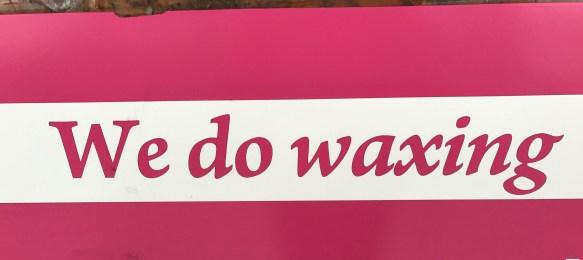When I read hand-lettered signs in small stores, I readily accept a certain number of mistakes from proprietors who, I presume, are too busy to proofread because they have to order stock, supervise employees, and fill out tax forms. But when major companies are involved, my expectations rise. Obviously I’m courting disappointment, because Those Who Should Know Better often don’t. Witness this advertisement from a nationwide cosmetics chain:

As a verb, “gift” strikes me as a bit pretentious, but it’s not incorrect. The direct object, though, is another issue entirely. The sign urges you to “gift” people. Human trafficking, anyone? Please say no, even if you have a few relatives you wouldn’t mind “gifting” to someone willing to take them far, far away from your holiday gatherings.
And then there’s the phone company. I won’t tell you which one; I imagine it’s easy to find horror stories about all of them. I had to visit and call the one responsible for this ad no fewer than eight times before I succeeded in canceling my late husband’s phone contract. Check out this recruitment pitch:

If they can’t come up with the proper contraction (“you’re,” not “your”), how can they “practice data story-telling, analytics, and more”? And while I’m on the subject, do we actually want “data story-telling”? Can’t we manage with “data” alone, leaving “story-telling” to fiction writers?
I count on good grammar when I read my favorite newspaper, The New York Times, and usually that’s what I get. Every once in a while, though, the editors miss something. Perhaps the excitement surrounding Amazon’s search for new office space overpowered this writer:

I wouldn’t mind “500,000 square foot modern of office space,” if I could figure out what it is.
One more, from a chain restaurant:

I’ve always wanted to try the wings at this restaurant, but I’ll pass on the “sloo smoked BBQ.” I’ve never liked the taste of “sloo.”

 Surely you weren’t planning on ushering guests into a room with a naked table! A four-legged pair of jeans would do nicely for a hip, can’t-be-bothered-to-dress-up dinette set. An evening gown with a very wide skirt saves formal hosts from the embarrassment of an underdressed eating surface. No hint from the shopkeeper about what sort of “table clothes” are available. If the customer isn’t pleased with the styles on sale, “sheets” could possibly preserve the table’s modesty.
Surely you weren’t planning on ushering guests into a room with a naked table! A four-legged pair of jeans would do nicely for a hip, can’t-be-bothered-to-dress-up dinette set. An evening gown with a very wide skirt saves formal hosts from the embarrassment of an underdressed eating surface. No hint from the shopkeeper about what sort of “table clothes” are available. If the customer isn’t pleased with the styles on sale, “sheets” could possibly preserve the table’s modesty.

 The bullet point in front of “house” was odd because there were no other items on the sign, hence no bulleted list. But if I’m opting to tinker with punctuation, I’m going for a comma after “house.” That comma would create a direct address statement appropriate to this holiday season: “House, hold items [so I don’t have to].” See? Shopping-stress relief!
The bullet point in front of “house” was odd because there were no other items on the sign, hence no bulleted list. But if I’m opting to tinker with punctuation, I’m going for a comma after “house.” That comma would create a direct address statement appropriate to this holiday season: “House, hold items [so I don’t have to].” See? Shopping-stress relief!



 Unanswered Question: What happened to the candlestick maker?
Unanswered Question: What happened to the candlestick maker?


 Do you call the front desk for “boom service,” and if so, how much do you tip the guy who lowers the boom? How do you delivery a “jobsite”? And what does a “boom service” showroom show?
Do you call the front desk for “boom service,” and if so, how much do you tip the guy who lowers the boom? How do you delivery a “jobsite”? And what does a “boom service” showroom show?
















